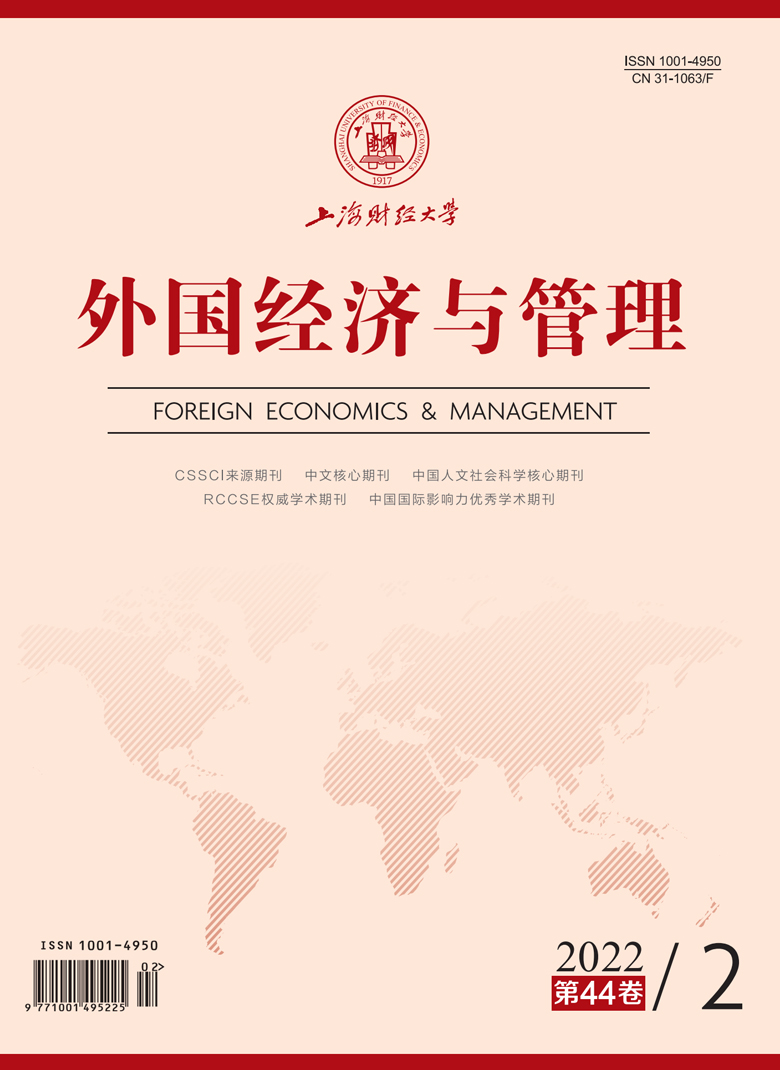税收规避作为一项重要的财务策略,现有文献主要从代理问题和信息不对称视角进行考察,较少关注企业间的影响及其经济后果。本文以2008—2019年我国A股非金融上市公司为研究样本,基于同伴效应视角,分别从行业和地区层面考察了税收规避对企业投资效率的影响。研究发现:(1)我国上市公司税收规避存在同伴效应,并且地区同伴效应要优于行业同伴效应。(2)税收规避同伴效应能够提升企业投资效率,地区同伴效应能减少投资过度,行业同伴效应能缓解投资不足。(3)税收规避同伴效应能够通过降低现金持有水平、减少代理成本以及提高企业信息透明度发挥其治理效应,补偿自身税收规避造成的投资效率下降,从而显著提升企业投资效率。进一步研究发现,在企业治理水平越高、同伴企业市场地位越高的情境下,税收规避同伴效应对投资效率的提升作用越显著。本文不仅提供了税收规避影响因素方面新的经验证据,丰富了同伴效应及其经济后果的研究成果,还对企业和税收征管部门在不同情境下制定合理的财务决策和征管政策有重要的现实意义。
税收规避同伴效应能提升企业投资效率吗?——来自A股非金融上市公司的经验证据
摘要
参考文献
1 方红星, 金玉娜. 公司治理、内部控制与非效率投资: 理论分析与经验证据[J]. 会计研究,2013, (7): 63-69,97. DOI:10.3969/j.issn.1003-2886.2013.07.009
4 刘行, 叶康涛. 企业的避税活动会影响投资效率吗?[J]. 会计研究,2013, (6): 47-53,96. DOI:10.3969/j.issn.1003-2886.2013.06.007
5 刘行, 赵健宇, 叶康涛. 企业避税、债务融资与债务融资来源——基于所得税征管体制改革的断点回归分析[J]. 管理世界,2017, (10): 113-129. DOI:10.3969/j.issn.1002-5502.2017.10.009
6 沈洪涛, 苏亮德. 企业信息披露中的模仿行为研究——基于制度理论的分析[J]. 南开管理评论,2012, 15(3): 82-90,100. DOI:10.3969/j.issn.1008-3448.2012.03.010
8 王亮亮. 金融危机冲击、融资约束与公司避税[J]. 南开管理评论,2016, 19(1): 155-168. DOI:10.3969/j.issn.1008-3448.2016.01.014
10 易志高, 李心丹, 潘子成, 等. 公司高管减持同伴效应与股价崩盘风险研究[J]. 经济研究,2019, 54(11): 54-70.
11 钟田丽, 张天宇. 我国企业资本结构决策行为的“同伴效应”——来自深沪两市A股上市公司面板数据的实证检验[J]. 南开管理评论,2017, 20(2): 58-70. DOI:10.3969/j.issn.1008-3448.2017.02.006
12 Adhikari A, Derashid C, Hao Z. Public policy, political connections, and effective tax rates: Longitudinal evidence from Malaysia[J]. Journal of Accounting and Public Policy,2006, 25(5): 574-595. DOI:10.1016/j.jaccpubpol.2006.07.001
13 Chen S, Chen X, Cheng Q, et al. Are family firms more tax aggressive than non-family firms?[J]. Journal of Financial Economics,2010, 95(1): 41-61. DOI:10.1016/j.jfineco.2009.02.003
14 Chen S, Ma H. Peer effects in decision-making: Evidence from corporate investment[J]. China Journal of Accounting Research,2017, 10(02): 167-188. DOI:10.1016/j.cjar.2016.11.002
15 Desai M A, Dharmapala D. Corporate tax avoidance and firm value[J]. The Review of Economics and Statistics,2009, 91(3): 537-546. DOI:10.1162/rest.91.3.537
16 Desai M A, Dharmapala D. Corporate tax avoidance and high-powered incentives[J]. Journal of Financial Economics,2006, 79(1): 145-179. DOI:10.1016/j.jfineco.2005.02.002
17 Durnev A, Mangen C. The spillover effects of MD&A disclosures for real investment: The role of industry competition[J]. Journal of Accounting and Economics,2020, 70(1): 101299. DOI:10.1016/j.jacceco.2020.101299
18 Faulkender M, Yang J. Is disclosure an effective cleansing mechanism? The dynamics of compensation peer benchmarking[J]. Review of Financial Studies,2013, 26(3): 806-839. DOI:10.1093/rfs/hhs115
19 Gigler F. Self-enforcing voluntary disclosures[J]. Journal of Accounting Research,1994, 32(2): 224-240. DOI:10.2307/2491283
20 Goh B W, Lee J, Lim C Y, et al. The effect of corporate tax avoidance on the cost of equity[J]. The Accounting Review,2016, 91(6): 1647-1670. DOI:10.2308/accr-51432
21 Graham J R, Tucker A L. Tax shelters and corporate debt policy[J]. Journal of Financial Economics,2006, 81(3): 563-594. DOI:10.1016/j.jfineco.2005.09.002
22 Grennan J. Dividend payments as a response to peer influence[J]. Journal of Financial Economics,2019, 131(3): 549-570. DOI:10.1016/j.jfineco.2018.01.012
23 Harford J, Mansi S A, Maxwell W F. Corporate governance and firm cash holdings in the US[J]. Journal of Financial Economics,2008, 87(3): 535-555. DOI:10.1016/j.jfineco.2007.04.002
24 Hyunseob K, Howard K. The asset redeployability channel: How uncertainty affects corporate investment[J]. Review of Financial Studies,2017, 30(1): 245-280. DOI:10.1093/rfs/hhv076
25 Joo C, Yang I, Yang T. Peer group effect in firm cash holding policy: Evidence from Korean manufacturing firms[J]. Asia-Pacific Journal of Financial Studies,2016, 45(4): 535-573. DOI:10.1111/ajfs.12138
26 Kim J B, Li Y, Zhang L. Corporate tax avoidance and stock price crash risk: Firm-level analysis[J]. Journal of Financial Economics,2011, 100(3): 639-662. DOI:10.1016/j.jfineco.2010.07.007
27 Leary M T, Roberts M R. Do peer firms affect corporate financial policy?[J]. The Journal of Finance,2014, 69(1): 139-178. DOI:10.1111/jofi.12094
29 Manski C F. Identification of endogenous social effects: The reflection problem[J]. The Review of Economic Studies,1993, 60(3): 531-542. DOI:10.2307/2298123
30 Parsons C A, Sulaeman J, Titman S. The geography of financial misconduct[J]. The Journal of Finance,2018, 73(5): 2087-2137. DOI:10.1111/jofi.12704
31 Peress J. Product market competition, insider trading, and stock market efficiency[J]. Journal of Finance,2010, 65(1): 1-43. DOI:10.1111/j.1540-6261.2009.01522.x
32 Richardson S. Over-investment of free cash flow[J]. Review of Accounting Studies,2006, 11(2-3): 159-189. DOI:10.1007/s11142-006-9012-1
33 Seo H. Peer effects in corporate disclosure decisions[J]. Journal of Accounting and Economics,2021, 71(1): 101364. DOI:10.1016/j.jacceco.2020.101364
34 Shackelford D A, Shevlin T. Empirical tax research in accounting[J]. Journal of Accounting and Economics,2001, 31(1-3): 321-387. DOI:10.1016/S0165-4101(01)00022-2
35 Shroff N, Verdi R S, Yost B P. When does the peer information environment matter?[J]. Journal of Accounting and Economics,2017, 64(2-3): 183-214. DOI:10.1016/j.jacceco.2017.03.005
36 Stoughton N M, Wong K P, Yi L. Investment efficiency and product market competition[J]. Journal of Financial & Quantitative Analysis,2017, 52(6): 2611-2642.
37 Tang T. A review of tax avoidance in China[J]. China Journal of Accounting Research,2020, 13(04): 327-338. DOI:10.1016/j.cjar.2020.10.001
38 Wang F J, Xu S L, Sun J Q, et al. Corporate tax avoidance: A literature review and research agenda[J]. Journal of Economic Surveys,2020, 34(4): 793-811. DOI:10.1111/joes.12347
引用本文
洪金明, 王梦凯, 马德芳. 税收规避同伴效应能提升企业投资效率吗?——来自A股非金融上市公司的经验证据[J]. 外国经济与管理, 2022, 44(2): 52-68.
导出参考文献,格式为:
上一篇:创业倦怠研究现状探析与未来展望





 11738
11738  7585
7585

